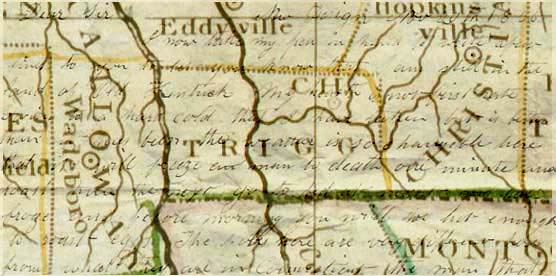“The folks here are very different from what they are in Connecticut.” It was 1836, and the economy in his home town of Washington, Connecticut had impelled Noah Pond to sign on for a 22-month stint as an itinerant seller (read: peddler) in Kentucky, based in the Trigg County community of New Design. His letters home offer us a fascinating picture of this frontier community as seen through the eyes of a curious but homesick Yankee.
In Trigg County, Pond found immigrants from Pennsylvania, Virginia and the Carolinas, as well as Dutch, Scots-Irish, English and “now and then a Spaniard.” He also found a county of slaveholders, and noted with interest the habits of the 16 enslaved Africans who labored on the farm where he boarded. Witnessing their informal marriage customs, their Christmas and Easter holidays, and the latitude given them to farm small plots of their own, Pond indulged the conceit that they were “better off than the poorer class of people in the east.”
Generally impressed by local farming practices and prices, Pond saw the chance for an enterprising settler to make good. For the most part, however, he couldn’t shake the feeling of being a stranger in a strange land. He had to turn on the charm to get a Yankee-hating old Dutchman and his wife to buy some of his goods, and was outraged at the costs, both in travel and treatment, of a doctor’s care when he fell ill. He found teachers and preachers in short supply— “I can preach better myself than the Priests can,” he wrote, “for they are nothing but Farmers”—but perhaps Pond’s biggest complaint was the fickle Kentucky climate. “The weather is so changeable here,” he wailed, “that it will freeze a man to death one minute and roast him the next go to bed at night half froze and before morning you will be hot enough to roast eggs.” He concluded that one needed a “constitution like a Horse to stand it.”
Noah Pond’s letters are part of the Manuscripts & Folklife Archives of WKU’s Department of Library Special Collections. Click here to access a finding aid. For more collections on frontier life in Kentucky, search TopSCHOLAR and KenCat.

